Candidates preparing for the RSMSSB Livestock Assistant Recruitment 2025 must thoroughly understand the updated RSMSSB Livestock Assistant Syllabus and exam pattern to plan their preparation efficiently. The exam evaluates candidates’ knowledge of Veterinary Science and General Awareness of Rajasthan, both essential to secure a position as a Livestock Assistant. This article provides a detailed subject-wise syllabus, exam pattern, and key highlights to help aspirants streamline their studies.
Rajasthan Livestock Assistant Syllabus 2025
The syllabus for RSMSSB Livestock Assistant 2025 is designed to assess both domain-specific expertise and awareness of Rajasthan’s socio-cultural and scientific environment. It includes comprehensive topics from Veterinary Science such as animal nutrition, breeding, and health management, along with state-focused general studies. Candidates must approach the syllabus strategically, covering both theoretical understanding and practical concepts.
RSMSSB Livestock Assistant (LSA) Exam Pattern
The RSMSSB Livestock Assistant Exam comprises two sections: General Awareness and Veterinary Science. The General Awareness section carries 50 marks, while the Veterinary Science section is worth 100 marks, making a total of 150 marks. The exam duration is 3 hours (180 minutes), and it consists of multiple-choice questions, with each correct answer awarding one mark. This exam evaluates your knowledge of Rajasthan’s General Awareness and Veterinary Science. Effective time management is essential to ensure you complete the exam within the allotted 3 hours.
| Subject | Marks | Time |
|---|---|---|
| General Awareness | 50 | 3 Hours |
| Veterinary Science | 100 | |
| Total | 150 |
RSMSSB Livestock Assistant Syllabus
The RSMSSB Livestock Assistant Exam Syllabus is broadly divided into two key subjects: General Awareness of Rajasthan and Veterinary Science. The General Awareness section carries 50 marks and includes topics like history, geography, culture, and science related to the state. The Veterinary Science section is allotted 100 marks and covers areas such as anatomy, animal nutrition, breeding, and disease management. The table below provides a clear subject-wise breakdown of the topics covered.
| Paper | Topic | Details |
|---|---|---|
| Paper 1: General Knowledge | History, Art & Culture, Literature, Tradition, and Heritage of Rajasthan | |
| Mughal-Rajput Relations | Relations between the Mughal Empire and Rajput states. | |
| Unification of Rajasthan | The historical process of Rajasthan’s unification. | |
| Important Forts, Structures, and Monuments | Notable forts, monuments, and architectural structures in Rajasthan. | |
| Major Sources of the History of Rajasthan | Key historical texts, manuscripts, and sources documenting Rajasthan’s past. | |
| Major Dynasties of Rajasthan and Their Achievements | Overview of major dynasties in Rajasthan like the Rajputs, Mughals, and their contributions. | |
| Prehistoric Civilizations of Rajasthan | Early civilizations and archaeological findings in Rajasthan. | |
| Salient Features of Architecture | Key architectural styles and landmarks of Rajasthan. | |
| Folk Music, Folk Dances, Musical Instruments, Festivals, Fairs, Jewellery | Traditional cultural aspects including folk music, dances, festivals, and crafts. | |
| Religious Movements and Deities of Rajasthan | Religious practices, movements, and deities worshipped in Rajasthan. | |
| Major Works of Rajasthani Language and Literature, Local Dialects | Significant literary works in Rajasthani language, dialects, and literary traditions. | |
| Major Paintings, Styles, and Handicrafts of Rajasthan | Traditional arts, crafts, and painting styles specific to Rajasthan. | |
| Historic Tourist Spots | Key tourist destinations with historical significance in Rajasthan. | |
| Important Rajasthani Personalities | Prominent historical and contemporary figures from Rajasthan. | |
| Princely States of Rajasthan, British Treaties, and the 1857 Revolt | Political history involving princely states, British treaties, and the Indian rebellion of 1857. | |
| Rajasthan’s Political Awakening and Development – Special Reference to Women, Farmers, and Tribes | Political movements including those led by women, farmers, and tribal groups, and the Prajamandal Movement. | |
| Geography of Rajasthan | ||
| Location and Extent | Geographical positioning and boundaries of Rajasthan. | |
| Main Physical Divisions | Description of Rajasthan’s primary physiographic regions: desert, Aravalli hills, plains, and plateau. | |
| Drainage System | Overview of rivers, lakes, and water bodies, including their patterns and characteristics in Rajasthan. | |
| Climate | General climatic conditions, seasonal variations, and their impact on Rajasthan. | |
| Soil | Types of soils found in Rajasthan and their distribution. | |
| Natural Vegetation | Types of natural plant life and forests in Rajasthan. | |
| Forest and Wildlife Conservation | Efforts and initiatives for preserving forests and wildlife in Rajasthan. | |
| Environmental and Ecological Issues | Key challenges and concerns related to the environment and ecosystems in Rajasthan. | |
| Desertification | The process and impacts of desert expansion in Rajasthan. | |
| Agro-climatic Regions and Major Crops | Different agricultural zones based on climate and the main crops cultivated in Rajasthan. | |
| Livestock | Information on animal husbandry and various types of livestock in Rajasthan. | |
| Multi-purpose Projects | Overview of large-scale development projects serving multiple objectives like irrigation and power generation in Rajasthan. | |
| Irrigation Projects | Major irrigation schemes and their role in agriculture across Rajasthan. | |
| Water Conservation | Methods and practices for conserving water resources in Rajasthan. | |
| Transport | Modes of transportation including roads, railways, and air connectivity within Rajasthan. | |
| Mineral Resources | Important minerals found in Rajasthan and their economic significance. | |
| Paper 2: Veterinary Science | Introductory Veterinary Anatomy | Basic concepts and understanding of animal anatomy. |
| Introductory Animal Management | Principles and practices in managing animals. | |
| Introductory Animal Breeding and Genetics | Basics of animal breeding, genetics, and inheritance principles. | |
| Introductory Animal Reproduction | Overview of reproductive systems and practices in animals. | |
| Introductory Veterinary Physiology and Biochemistry | Basic physiological and biochemical processes in animals. | |
| Animal Husbandry Extension | Knowledge of animal husbandry practices and extension services. | |
| Introductory Veterinary Pharmacology | Basics of veterinary pharmacology, drug use, and treatment. | |
| Introductory Veterinary Medicine | Introduction to veterinary medicine and medical practices for animals. | |
| Minor Veterinary Surgery | Basics of minor surgical procedures in veterinary practice. | |
| Introductory Animal Nutrition | Fundamentals of animal nutrition, including dietary requirements. | |
|
Related Posts |
|
| Rajasthan Livestock Assistant Admit Card 2025 | Rajasthan Livestock Assistant Syllabus |

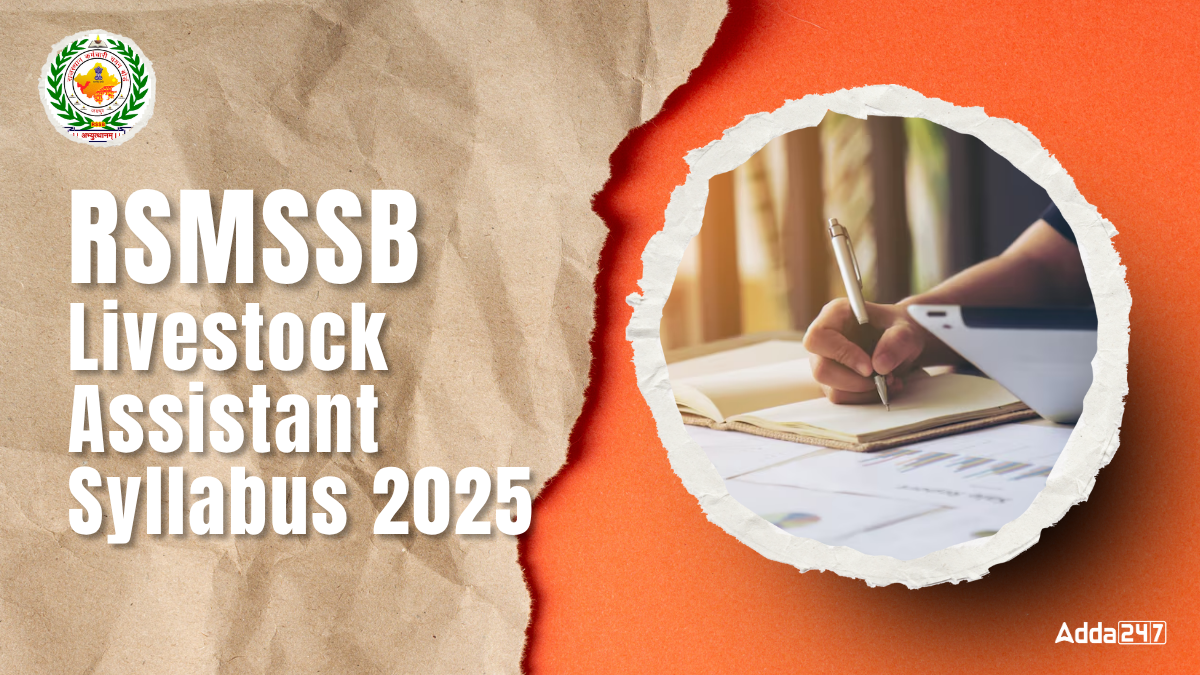


 Punjab Patwari Syllabus 2026, Check Exam...
Punjab Patwari Syllabus 2026, Check Exam...
 RRB Section Controller Syllabus And New ...
RRB Section Controller Syllabus And New ...
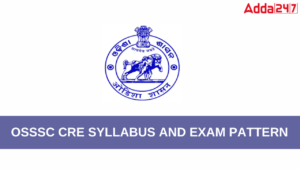 OSSSC CRE Syllabus 2026 Prelims and Main...
OSSSC CRE Syllabus 2026 Prelims and Main...
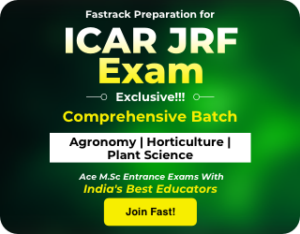

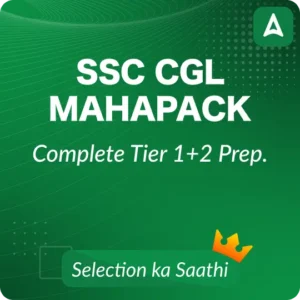
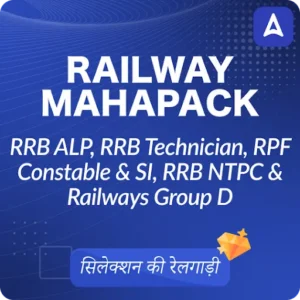
 Adda247 Job portal has complete information about all Sarkari Jobs and Naukri Alerts, its latest recruitment notifications, from all state and national level jobs and their updates.
Adda247 Job portal has complete information about all Sarkari Jobs and Naukri Alerts, its latest recruitment notifications, from all state and national level jobs and their updates.



